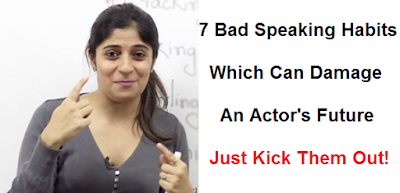Career Failing Due to Any of These 7 Bad Speaking Habits?
Unfortunately, it�s not just what you say, but how you say it and how it�s perceived that give your words negative meaning. Discussing an event that has to do with someone who isn�t present, no matter how harmless, can come off as gossip, and will almost always come back to bite you.
Sadly, this is common amongst some actors with a few successes under their belt.
You�ll also come off as judgmental when discussing a person who isn�t present to defend themselves. Make it a habit to spread good information and notions about people when they�re not around, so your words can�t possibly be twisted by others.
You should also avoid complaining or making excuses, and take accountability for your actions. When you place blame on others for your shortcomings, you detract from your integrity and make yourself appear untrustworthy.
Even when you mess up, being truthful to yourself and others is the only way you�ll be able to grow, and the only way others will commend you for such growth.
 |
| Change habits. Which ones? Why? How? |
1. Gossiping
Speaking badly of somebody else seems to have a chain reaction. If you indulge in gossip and speak irrelevantly to others you may develop a bad reputation about you which results into others talking bad about you.
2. Becoming a judge
Your conversation involves your judgement of others like �she is an average actor� or �he is no good in comedic roles� etc. People may therefore start avoiding you and soon you may find yourself alone.
3. Being negative
Being positive always makes a person likeable and welcome. A negative talk or an opinion is always depressing and people tend to avoid such characters
4. Complaining
Complaining can easily become a habit because passing a buck and blaming others for your mistakes makes you comfortable. Be careful. You can be labeled as a person who complains all the times, whether its work or nature or weather or traffic.
5. Making excuses
It�s like �Complaining� as stated above. You always blame external reasons for your failures. However, a subtle difference is these �excuses� for failures are everything, and everybody else except �YOU�. Remember, in your profession of acting, nobody believes and accept �an excuse� as a valid reason for your failures because there are hundreds of your other competitors who refrain from making excuses
6. Exaggerating
Warning: Exaggeration in language, behavior and attitude may convey that you are lying and may be perceived as artificial and a show off. This is also true in acting for the camera where subtle emotions produce better results than theatrical, exaggerated and loud gestures which may look fake and unnecessary.
7. Being Adamant and Overbearing
Nobody likes arrogant, rigid and overbearing person. If you�re not flexible, willing to listen and accept others views and continue to blow your own trumpet, soon you will become an unwelcome person in an individual or in a group�s conversation. Your friend circle may shrink in due course of time leaving you alone
If you have any of the above speaking habits and want to correct them:
1. Be aware of how to talk and behave
2. The best solution is contact your acting coach and get his / her guidance. It's like going to a specialist doctor for a medical treatment
3. Ask Your close friends from the industry
Based on Source

Comments
Post a Comment